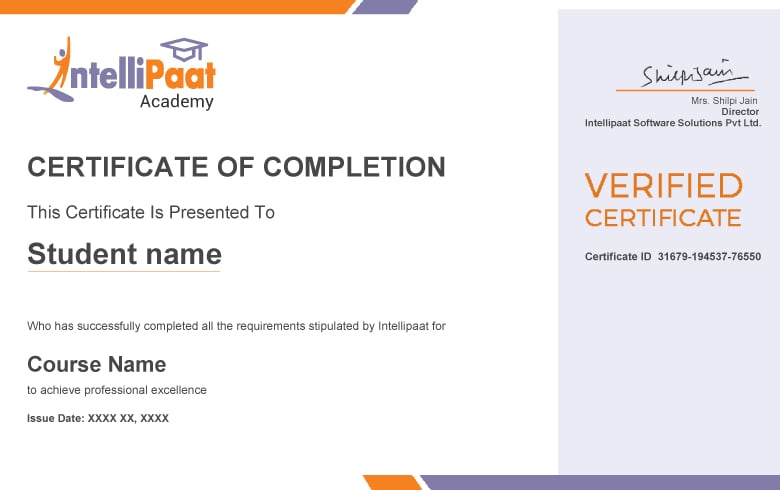Skills you will learn in this Free DSA Course
About the Free DSA Course
Read More
Free DSA Course Curriculum
Basics of C and Data Structures
- About Computer – CPU, ALU, Register, Cu, Primary Memory, RAM, ROM, Cache Memory, Memory terms, Input Devices, Output Devices, Storage Devices
- Computer Languages: 1. Low Level Language, 2. Machine Language, 3. Assembly Language, 4. High Level Language
- Number Systems: Conversion of Decimal to Binary, ASCII
- Compiler and Interpreter: Compiler Diagram, Interpreter Diagram
First C Program
- C Program Structure
- Program building C program
- Practice and Exercise Questions
Basic I-O in C
- Input/output in C,
- Formatted Output with printf
- Format Conversion specifies scanf
- Practice & Exercise Questions
C Instructions
- Types of instructions
- Arithmetic Instructions
- Three types of Arithmetic Instructions: Integer mode Arithmetic Statement, Real mode Arithmetic Statement, Mixed mode arithmetic statement
- Associativity of operators, Examples
- Practice Questions & Exercise Questions
C-Data Types
- C Data types
- Void type
- Declaration
- Definition and Initialisation
- Variable Qualifier
- Operators
- Practice & Exercise Questions
C- Control Instructions
- Types of control instructions
- The decision control structures
- The conditional operator
- The case control structure
- The switch case control
- Why break is needed in switch case
- What is the use of break keyword
- Practice & Exercise Questions
Functions in C
- Explain Functions
- Structure of C program
- Structure of C function
- Practice & Exercise Questions
Recursion in C
- Define Recursion
- Recursive function
- Recursion vs. Iteration
- Practice & Exercise Questions
Pre-processor In C
- Explain Pre-processor
- Program flow
- Advantages of Pre-processor
- Pre-processor directives
- Predefine Macros
- Practice & Exercise Questions
Arrays in C
- Accessing Array elements,
- Passing array to a function,
- Two dimensional Array
- Practice & Exercise Questions
String in C
- Memory presentation of string
- Lets print some string
- Operations on String
- Practice & Exercise Questions
Structure and Union
- Structure vs. Array
- Declaring structure
- Example of structure
- Initialisation
- Accessing structure variable
- Array of structure
- Passing Structure in function
- Structure vs. Union
- Practice & Exercise Questions
File I – O in C
- File I/O
- Reading and writing from file
- Reading and writing in file
- Example for writing a file
- Binary file I/ O
- Example for binary I/O
- Practice & Exercise Questions
Pointers in C
- Pointer Arithmetic
- Pointer Arithmetic and Array
- Advice and precaution
- Summary
- Practice & Exercise Questions
Pointers and Arrays
- Arrays from pointers perspective
- Multi Dimension Arrays
- Write a program to input a matrix in print it
- Practice & Exercise Questions
Dynamic Memory Allocation
- Explain Dynamic Memory Allocation
- How to allocate memory dynamically
- Practice & Exercise Questions
Linked List
- Linked list
- Linked List Terminology
- Creation of link list
- Traversing link list
- Practice & Exercise Questions
Tree and Searching
- Binary tree terminology
- Tree traversal
- Practice & Exercise Questions
Sorting
- Sorting Applications
- Some sorting Methods
- Bubble sort
- Quick sort
- Practice & Exercise Questions
Free Data Structures and Algorithms Course FAQs
Why should you take up this Data Structures and Algorithms free course?
During the recruitment process, most companies test the candidates’ skills in C programming and Data Structures. Whether you are an Electronics Engineer, a BCA student, or an IT graduate, you will be tested on the skills that we will cover in this course.
This course will serve as the ultimate guide if you want to ensure good job opportunities in the IT industry, mobile app companies, or embedded software organizations and become a leading software professional.
Who should sign up for this free Data Structures and Algorithms course?
The following people can consider applying for this data structures free course:
- Graduates, undergraduates, or postgraduates who want to build a career in programming in the IT industry
- Professionals who wish to brush up on their C programming and advanced data structures knowledge
Are there any prerequisites for taking up this online free Data Structures and Algorithms course?
No, there are no prerequisites mandated to take up this online course. All you need is a good internet connection and you are good to start your free Data Structures course immediately.
What will you learn in this free online course for Data Structures?
In this course, you will get to:
- Learn the basics of C programming
- Understand and implement various advanced features in C like data types and operators, variables, functions, arrays, linked lists, strings, structures, pointers, and more
- Get a deep insight into data structures: Binary tree search and different types of sorting
- Become an expert in C and data structures concepts
- Execute exercises and solve assignments on programming concepts
How can I learn data structures and algorithms for free at home?
You can learn data structures and algorithms for free at home through various online resources like YouTube tutorials, Free C & Data Structures Course from Intellipaat, etc.
Is DSA very difficult?
DSA is relatively easy. With perfect focus and consistent practice, learners can complete the course with ease and at their own pace.
Is DSA the same for all languages?
Yes, the core concepts of data structures and algorithms are the same across languages. The only thing that changes is the syntax that you need to learn and understand the fundamentals.
How long will it take to learn Data Structures and Algorithms through this free course?
Learning DSA through these free courses requires a constant investment of time and effort. For learners, it is important to put much interest in completing the free course in 4-8 months.

